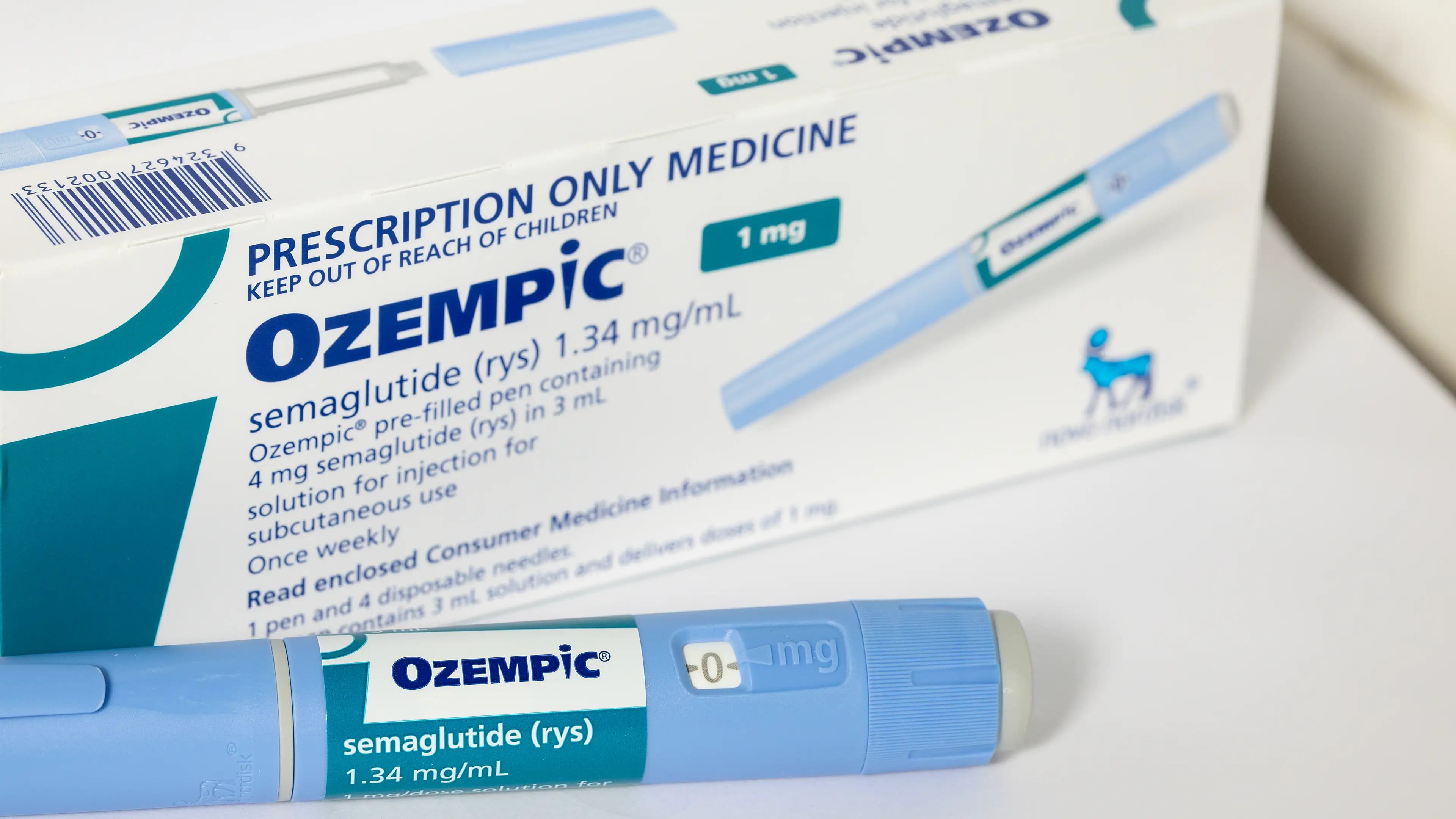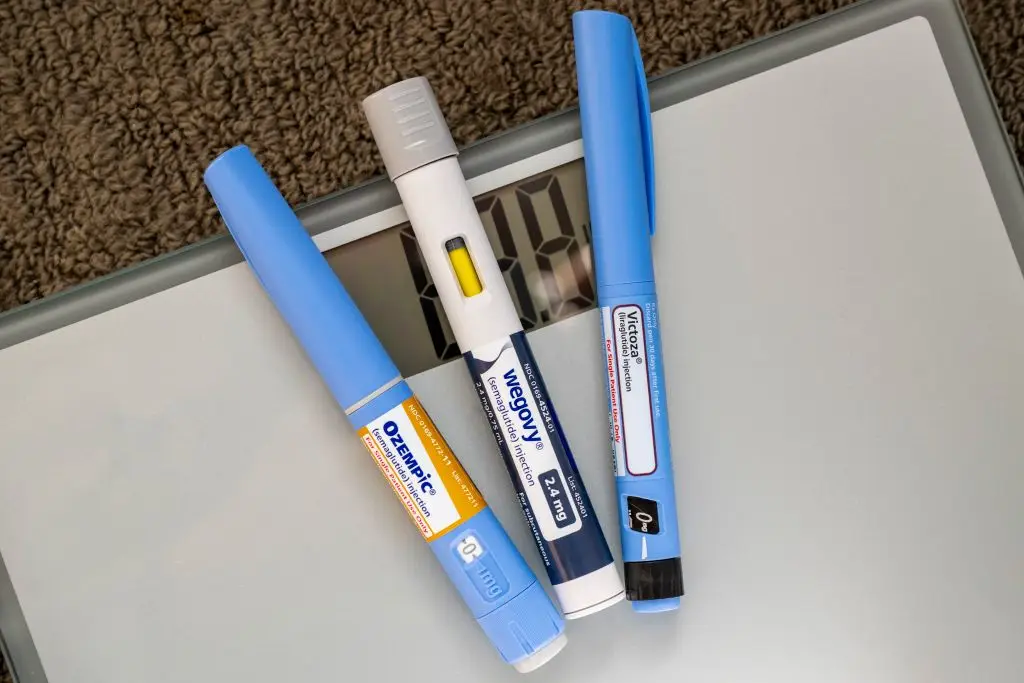
A doctor has explained the main problem people taking drugs for weight loss, such as Ozempic, are going to face.
Drugs such as Ozempic, Wegovy and Mounjaro have surged in popularity since they first became more widely known.
Some of them are even prescribed on the NHS now, though the most famous one is still only meant to be prescribed for people with type-2 diabetes, not for weight loss.
That hasn't stopped people from using Ozempic, but even if the drugs are working for weight loss, the people taking them might end up running into some potential problems.
Advert
Yep, while these drugs might be great for then waistline, Dr Giles Yeo MBE of the University of Cambridge has explained some of the major issues facing people using them, like 'Ozempic face', for example.

How do drugs like Ozempic work?
While the various drugs used for weight loss contain different ingredients, they all basically work in a similar way by triggering a gut hormone called GLP-1 which tells your brain you're full so you don't feel the need to eat anymore.
A person typically injects themselves with the drug once a week and makes themselves feel full enough that they'll have smaller portion sizes.
It's worked wonders for a lot of the people taking it, though some have said it's giving them side-effects or not been that effective for their own experience.
Some people taking them will experience side effects. There are essentially no drugs which don't have side effects, and taking them could also change your appearance due to rapid weight loss.
Dr Yeo told LADbible: "The good thing about the drugs is they're powerful. They work. They're broadly safe. The bad thing about these drugs is they're powerful, and they work for anyone.
"It doesn't matter your starting weight. If you're 350 pounds, looking to lose 100 pounds, well, fine, the drug is designed for you.
”It will also work on a 16 year old girl who's 75 pounds, that's the problem. So you need to make sure the right person gets it. You can't sell it like sweets."

'Ozempic Face'
That these drugs work is evident, but the impact they have on your body isn't entirely positive.
There has been much discussion over various conditions which these weight loss drugs have caused, including things such as 'Ozempic face' where people taking drugs for weight loss are noticing dramatic changes in their appearance.
"Part of the 'Ozempic Face', 'Ozempic this or that' is the fact that people are just taking it and not doing s**t," Dr Yeo said, stressing that you couldn't just take the jab and expect it to do everything.
Dr Yeo stressed that something like 'Ozempic Face' was 'not unique to the drug' and was a consequence of 'losing quite a lot of weight quite quickly'.
He said: "People want to lose the weight. They’d rather look a little bit more wrinkly. It’s difficult because you can't exercise a face. I think the critical bit of it is that, space aside, it is going to be true that if you lose weight rapidly, not only do you lose fat, you also lose muscle or lean mass.

"Which means that actually an exercise regime and exercise plan and exercise intervention is going to be very, very important as part of the deployment of these drugs, particularly as they get real penetration."
Accepting the side effects of the drug is just part of the bargain.
Dr Yeo spoke about the question 'gym or jab' when it came to weight loss and the part drugs like Ozempic, Wegovy and Mounjaro played in them, saying the answer is 'gym and jab', recommending that people use the time the drugs gave them to change their lifestyles for healthier ones.
The doctor said that people needed to take 'a non-hysterical view of it' and stressed that we shouldn't be doling out the drugs 'like sweets', but shouldn't be 'overly negative' either.
It should be noted here that the drug's manufacturer, Novo Nordisk, says it does not recognise 'Ozempic face' as a legitimate 'side effect or safety concern'.
How long will you be on the drugs?
Dr Yeo explained that 'a large proportion of people' who take drugs such as Ozempic for weight loss 'will be on the drug in some form for a pretty long time' otherwise they'll quickly regain the weight.
He said: "The majority of individuals will either stop and gain the weight back or have to be on this some version of treatment for a pretty long time."
If the weight loss drugs work well and are successful then that's all well and good, but plenty of people buying them now (and Dr Yeo notes that around 95 percent of the people taking weight loss drugs in the UK are getting them privately instead of through the NHS) might not be expecting to sign up to them basically indefinitely.

"The only thing the drug does is make you feel full up. It doesn't improve your diet. It doesn't it doesn't do anything else," he explained, outlining the need to use the window of opportunity to make some lifestyle changes.
"You do need to take the opportunity, particularly as now you don't feel hungry when you exercise, or don't feel as hungry to exercise."
Dr Yeo explained that while the initial course of taking a drug was the 'weight loss stage', once you'd completed your time on it you'd be in something called the 'maintenance stage' if you didn't want to quickly undo all that time and money spent shedding it.
What comes after Ozempic?
Time will tell how more people react to coming off the weight loss drugs, but Dr Yeo explained that pharmaceutical companies were looking at ways to adapt their drugs for the maintenance stage.
He said: "What all the companies are testing at the moment are different ways of tweaking the drug for the maintenance stage. This can include so called micro dosing, so lower dosage, or increasing the distance between the injections, or we're now hearing of pill versions of these things coming up which are less effective, but it's a pill.
"So I think for a large proportion of individuals, that is going to be the situation.
"We within the community don't know what this looks like yet, because it's only now that there'll be people reaching the end of their two years, millions of people, and then we'll have a good idea what maintenance is going to look like."